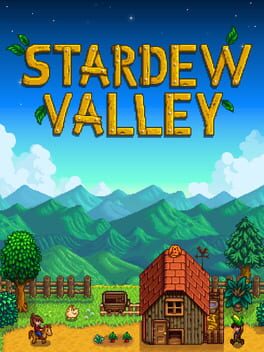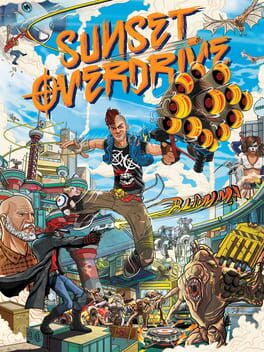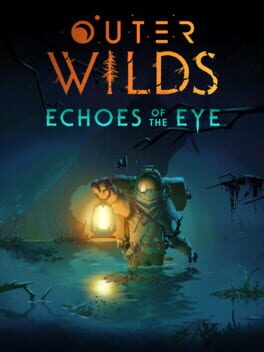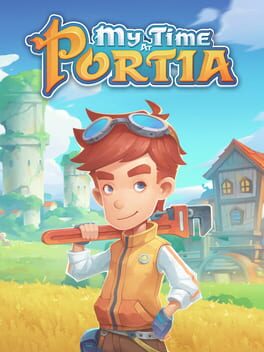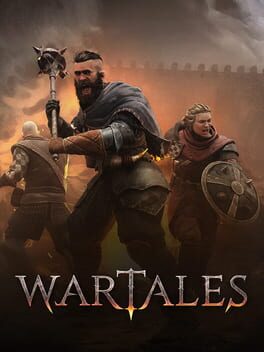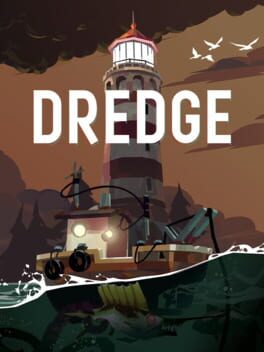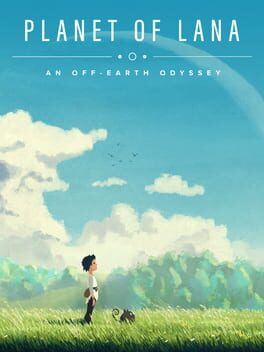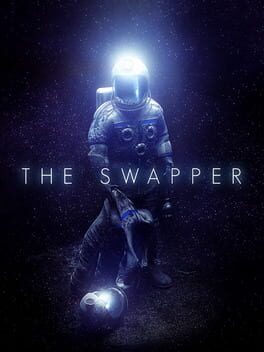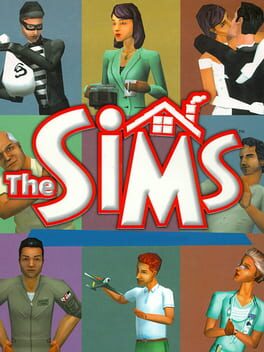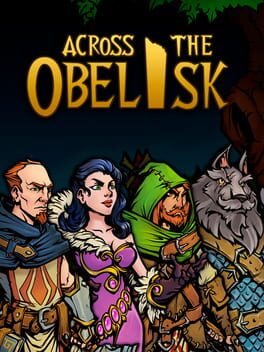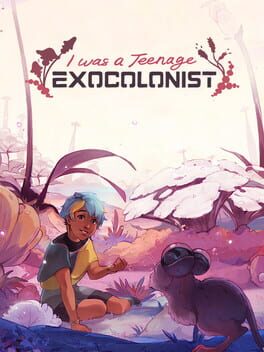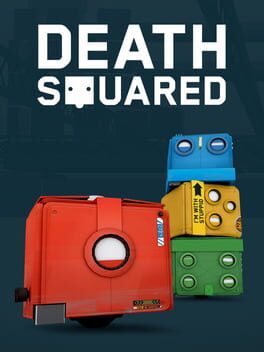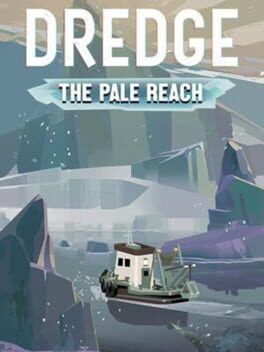NeutronRock
2016
A genuine classic. Stardew Valley is absolutely majestic in what it does, the theme and gameplay are chilled out and relaxing with a small handful of gameplay loops that have you feeling a real part of this idyllic rural town. The look is cute and colourful and the soundtrack is utterly transporting.
On top of being a relaxing slice of life - the mechanics of Stardew Valley have depth and allow for clever planning or creative designing depending on how you want to play. There's even mechanically difficult skill based challenges, admittedly only in the fishing. It is the most difficult but also the best fishing minigame I've played.
Stardew Valley is easily the best game in its genre and an absolute must play.
On top of being a relaxing slice of life - the mechanics of Stardew Valley have depth and allow for clever planning or creative designing depending on how you want to play. There's even mechanically difficult skill based challenges, admittedly only in the fishing. It is the most difficult but also the best fishing minigame I've played.
Stardew Valley is easily the best game in its genre and an absolute must play.
2014
Mechanically great fun - parkour around a jungle-gym city like Sly Cooper and shoot zombies with crazy Ratchet & Clank style weapons. The whole idea is great, the execution is for the most part - you just have to ignore the slightly weak story, the tedious mission design, and occasionally cringeworthy humour.
Echoes of the Eye is a work of genius, just as Outer Wilds was before it. The locations, ideas, designs, and reveals are just incredible. Some as stunning as those from the original game.
It took me a while to even accept the DLC. The first time I tried to play it I stopped before making any discoveries, because it simply felt wrong to add any further story to one that was already so beautiful and complete. This feeling lingered for some time, but ultimately Echoes of the Eye does a good job of not stepping on the toes of the base game's story - and I think works by being more puzzley, while not oversaturating the compassion and empathy of the original story.
Echoes of the Eye dials up the intensity in some areas - especially the spooky - but dials up some frustrating elements in equal measure. As the DLC involves mostly one new location, you will repeatedly have to travel back in the same direction over and over and over and over.. and the nature of your experimentation will see you restarting loops very frequently towards the end.
It's not as good as Outer Wilds - although realistically almost nothing is - but the genuine magic of the exploration and reveals makes Echoes of the Eye are on equally as high a level, and it is a worthy extension to the game.
It took me a while to even accept the DLC. The first time I tried to play it I stopped before making any discoveries, because it simply felt wrong to add any further story to one that was already so beautiful and complete. This feeling lingered for some time, but ultimately Echoes of the Eye does a good job of not stepping on the toes of the base game's story - and I think works by being more puzzley, while not oversaturating the compassion and empathy of the original story.
Echoes of the Eye dials up the intensity in some areas - especially the spooky - but dials up some frustrating elements in equal measure. As the DLC involves mostly one new location, you will repeatedly have to travel back in the same direction over and over and over and over.. and the nature of your experimentation will see you restarting loops very frequently towards the end.
It's not as good as Outer Wilds - although realistically almost nothing is - but the genuine magic of the exploration and reveals makes Echoes of the Eye are on equally as high a level, and it is a worthy extension to the game.
2020
I haven't yet finished Baldur's Gate 3 - but with ~40hrs of playtime already under my belt I've easily played enough to join the choir of voices praising this game. Arguably, I prefer Larian's previous title; Divinity Original Sin II - but when games are this good, preferences are based on tiny details and not overall assessments of quality.
I'm having a blast with BG3, and I will for I imagine another 40 hours still.
I'm having a blast with BG3, and I will for I imagine another 40 hours still.
2019
2023
I didn't finish Wartales, and I highly doubt now that I ever will due to the game's enormous scale - but I enjoyed the 20+ hours of it that I did play, and respect the ideas the game was reaching for.
The turn based combat is tactical and clever with some interesting ideas that promote coherent and realistic-looking strategies. The party building is fun and you feel a real sense of ownership over your ragtag group of mercenaries. The world is enormous and filled with stories in each zone, making exploration and progress interesting.
That's where Wartales shines - but where it falters is a lack of clear focus: What game exactly was Wartales trying to be?
When you start your first save you're greeted with massive, game-defining options before you've even interacted with the mechanics. You choose how enemies should scale: proportionally, or by region? It's a huge difference, and how can both reasonably work within one game?
Wartales also encourages you to expand and grow your party - and it feels like the benefit is strength and manpower, while the cost is an increased need for resources and gold to keep them fed and paid. Except.. opposition groups will scale in number with yours, negating your increase in strength and dragging fights out for ~10x longer than they would have been previously. Further growth will only drag the game down.
It felt like Wartales wasn't quite focussed on what it should be, and as a result I was constantly second guessing my decisions from the second act onwards. Should I cut down my party, is there an optimal size, did I pick the wrong enemy scaling?
Those questions turn into obstacles and as you slam into them over and over, you lose momentum and eventually interest in Wartales. For ~20 hours of fun I don't regret playing this game, but I feel like a lack of focus and the potential for fights to transform from quick battles into tedious, slogging wars hold this game back from being truly exceptional.
The turn based combat is tactical and clever with some interesting ideas that promote coherent and realistic-looking strategies. The party building is fun and you feel a real sense of ownership over your ragtag group of mercenaries. The world is enormous and filled with stories in each zone, making exploration and progress interesting.
That's where Wartales shines - but where it falters is a lack of clear focus: What game exactly was Wartales trying to be?
When you start your first save you're greeted with massive, game-defining options before you've even interacted with the mechanics. You choose how enemies should scale: proportionally, or by region? It's a huge difference, and how can both reasonably work within one game?
Wartales also encourages you to expand and grow your party - and it feels like the benefit is strength and manpower, while the cost is an increased need for resources and gold to keep them fed and paid. Except.. opposition groups will scale in number with yours, negating your increase in strength and dragging fights out for ~10x longer than they would have been previously. Further growth will only drag the game down.
It felt like Wartales wasn't quite focussed on what it should be, and as a result I was constantly second guessing my decisions from the second act onwards. Should I cut down my party, is there an optimal size, did I pick the wrong enemy scaling?
Those questions turn into obstacles and as you slam into them over and over, you lose momentum and eventually interest in Wartales. For ~20 hours of fun I don't regret playing this game, but I feel like a lack of focus and the potential for fights to transform from quick battles into tedious, slogging wars hold this game back from being truly exceptional.
2023
Dredge is a neat game. It's pretty satisfying to play, has a solid theme and is clearly well polished - I think it's a game almost anyone would like, which is reflected by the Overwhelmingly Positive reviews, but I also think that Dredge for the most part is good but not great. It isn't the most exciting game mechanically, the small bits of story are not overly interesting, and the Lovecraftian, thalassophobia-inducing horrors are.. ignorable quite a lot of the time. You encounter them once, and then simply avoid them with no time pressure or sense of urgency that would force you to risk interacting with these potential threats.
The opening couple of hours are incredibly tense, built by the sense of the unknown - but soon Dredge starts to feel incredibly safe and the rest of the game is a fairly gentle plod of ticking boxes.
The opening couple of hours are incredibly tense, built by the sense of the unknown - but soon Dredge starts to feel incredibly safe and the rest of the game is a fairly gentle plod of ticking boxes.
2023
"Lanaaaaaaaaaaaaaa" - Sterling Archer
Planet of Lana is a decent game. It's relaxing to play, has a neat story, and excels in its cinematic 2.5D visual design. The moments in this game where the platforming in the foreground is supporting by the spectacle of the events in the background are where Planet of Lana shines.
Unfortunately in its actual mechanics of puzzle-platforming and stealth, Planet of Lana doesn't match the highs of its more traditional artistic merits. The game rolls out classics such as: pushing a box to use as a platform, standing on a button to raise a bridge, and waiting for an enemy to turn around so you can sneak past. It's not every puzzle, but in what is a fairly short 3-4hr game even a handful of mediocre puzzles can occupy a decent chunk of playtime.
It's certainly not a bad game. The platforming is solid, the little feline friend is a worthy companion - and the feel of the world, and intrigue of the underlying story are enough to keep you playing and I was satisfied with the conclusion. If you want something relaxing, slower, and cinematic - this is well worth playing. But if you're desperate for clever puzzle-platforming or snappy gameplay.. this isn't the planet for you.
Planet of Lana is a decent game. It's relaxing to play, has a neat story, and excels in its cinematic 2.5D visual design. The moments in this game where the platforming in the foreground is supporting by the spectacle of the events in the background are where Planet of Lana shines.
Unfortunately in its actual mechanics of puzzle-platforming and stealth, Planet of Lana doesn't match the highs of its more traditional artistic merits. The game rolls out classics such as: pushing a box to use as a platform, standing on a button to raise a bridge, and waiting for an enemy to turn around so you can sneak past. It's not every puzzle, but in what is a fairly short 3-4hr game even a handful of mediocre puzzles can occupy a decent chunk of playtime.
It's certainly not a bad game. The platforming is solid, the little feline friend is a worthy companion - and the feel of the world, and intrigue of the underlying story are enough to keep you playing and I was satisfied with the conclusion. If you want something relaxing, slower, and cinematic - this is well worth playing. But if you're desperate for clever puzzle-platforming or snappy gameplay.. this isn't the planet for you.
2013
The Swapper is a game where you solve puzzles by existing in multiple places at the same time.. sort of. It's got a strong visual design (that overcomes my usual aversion to detailed 3D looking assets in entirely 2D games) with a dark atmospheric spaceship to explore, and strong mysterious vibes in its story, mechanics and level design.
The puzzles themselves are more dynamic than I expected, introducing elements of timing and "skilled" platforming in a way that opens up the possibility space in an interesting way without being too mechanically demanding.
Having said that, I haven't been blown away by any puzzles throughout the first half or so of the game - and haven't experienced as power a moment of revelation as I would have liked from a game with such a compelling mechanical foundation.
I still haven't finished The Swapper yet, but I'm enjoying what I've played so far.
The puzzles themselves are more dynamic than I expected, introducing elements of timing and "skilled" platforming in a way that opens up the possibility space in an interesting way without being too mechanically demanding.
Having said that, I haven't been blown away by any puzzles throughout the first half or so of the game - and haven't experienced as power a moment of revelation as I would have liked from a game with such a compelling mechanical foundation.
I still haven't finished The Swapper yet, but I'm enjoying what I've played so far.
2000
Turns out that moving a reticule around your house with an analogue stick is actually my preferred way to play the sims. Moving people about with mouse clicks doesn't have me feeling quite as involved in the game. The Sims is great, it's success is thoroughly deserved - although in many ways I prefer the simplicity of The Sims over many of its more modern sequels.
This also had local co-op, something I think Sims titles now are really missing.
This also had local co-op, something I think Sims titles now are really missing.
2021
The balancing of the roguelite deckbuilding is fairly poor, the range of abilities and status effects is needlessly complicated, and I would typically dislike the nature of the roguelite upgrades this game offers because they artificially increase playtime without adding interesting variation (i.e you just died, but now you can add +1 to all melee attacks and go again..).
Having said that, roguelike deckbuilding is an inherently satisfying genre that's hard to truly get wrong - and Across the Obelisk saves its many flaws with its one defining feature: online co-op gameplay. Cooperative turn based strategy games are few and far between, and all the nitpicks fade into the background when you try to figure this one out with a friend or two.
As a solo game I don't highly recommend, but in co-op AtO works really well.
Having said that, roguelike deckbuilding is an inherently satisfying genre that's hard to truly get wrong - and Across the Obelisk saves its many flaws with its one defining feature: online co-op gameplay. Cooperative turn based strategy games are few and far between, and all the nitpicks fade into the background when you try to figure this one out with a friend or two.
As a solo game I don't highly recommend, but in co-op AtO works really well.
Relatively interesting. I gave this a go due to being in a mood for detailed, narrative RPGs and this being fairly well received. It's an interesting idea - playing through your teenage years in a colony trying to build a new life on an exoplanet. Your actions build your character's future skills, make and break friendships, or have an impact on the colony's structure and strength which can be the difference between life and death on this alien planet.
The idea is neat, and the overall story is genuinely interesting if you're into sci-fi - how could an exocolony not be? - and I was always interested in seeing what would happen at the end of each season through my action or inaction.
Mechanically the execution felt a little lacking with gameplay that often felt repetitive, consisting mostly of selecting rooms to work in each turn to gain some skill points in relevant attributes.
Similarly the card play felt like it could have been great, but instead peaked at good with a general level of okay/decent. Cards are acquired as "memories" based on your life in the colony which you then use in a minigame puzzle to complete challenge - and in terms of blending the story with the more "gamey" mechanics this felt like a great idea. Building a deck through the storytelling that reflected your character.. but largely you just acquire so many cards that the puzzle feels fairly similar no matter what decisions you've made.
Teenage Exocolonist is not a bad game, and I enjoyed playing it for a few hours for the sci-fi, exoplanet elements - but I don't think I'll be replaying to experience different events and endings.
The idea is neat, and the overall story is genuinely interesting if you're into sci-fi - how could an exocolony not be? - and I was always interested in seeing what would happen at the end of each season through my action or inaction.
Mechanically the execution felt a little lacking with gameplay that often felt repetitive, consisting mostly of selecting rooms to work in each turn to gain some skill points in relevant attributes.
Similarly the card play felt like it could have been great, but instead peaked at good with a general level of okay/decent. Cards are acquired as "memories" based on your life in the colony which you then use in a minigame puzzle to complete challenge - and in terms of blending the story with the more "gamey" mechanics this felt like a great idea. Building a deck through the storytelling that reflected your character.. but largely you just acquire so many cards that the puzzle feels fairly similar no matter what decisions you've made.
Teenage Exocolonist is not a bad game, and I enjoyed playing it for a few hours for the sci-fi, exoplanet elements - but I don't think I'll be replaying to experience different events and endings.
2017
I liked the idea of Death Squared, a co-op puzzle game with deliberate friction and frustration that makes for funny moments - but unfortunately it ran into the ultimate sin for puzzle games, the solutions were just.. boring. This button raises a platform, this one activates a trap. Death Squared's levels demonstrated its mechanics like an endless series of tutorials but never sparked joy with a truly clever or satisfying idea.
The Pale Reach adds one additional zone to Dredge, on a similar scale to each of the previous areas. It's decently designed and has one of the more interesting set-ups of Dredge's stories - but struggles with its identity.
This DLC is "mid-game" content, a location to explore as you progress through each other area. But also as a DLC it's something that many will play as an additional "endgame". With the suped-up engines of a completed Dredge playthough.. The Pale Reach's main threat couldn't keep up with my boats default speed, and I was finished with the DLC in about an hour.
Had The Pale Reach been designed for an endgame level of upgrades then all players new and old would have an extra area to enjoy. As it is, don't be prepared for too much if you've already completed Dredge.
This DLC is "mid-game" content, a location to explore as you progress through each other area. But also as a DLC it's something that many will play as an additional "endgame". With the suped-up engines of a completed Dredge playthough.. The Pale Reach's main threat couldn't keep up with my boats default speed, and I was finished with the DLC in about an hour.
Had The Pale Reach been designed for an endgame level of upgrades then all players new and old would have an extra area to enjoy. As it is, don't be prepared for too much if you've already completed Dredge.
